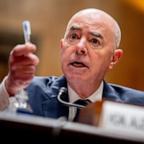President Obama's Promises: A Look Back at the 2009 Address to Congress
Many of the Issues Obama Addressed Last Year Remain His Top Challenges Today
Jan. 27, 2010— -- Middle-class Americans need immediate tax relief, President Obama will say tonight in his first, official State of the Union address to a country weary of wars and the economic downturn.
Obama will address Congress at 9:00 p.m. ET in a more forceful and feistier tone than he did nearly a year ago when he was cautiously optimistic, warning Americans of the tough road ahead but projecting optimism about economic recovery.
Much has changed since then. The Obamas have a new dog, the United States has experienced another terror attempt, which failed but still was enough to jolt the nation, and Democrats have lost a key Senate seat.
But the challenges that Obama faced this time last year remain largely the same. If anything, he is likely to face a much more skeptical -- even somewhat hostile -- audience.
Obama has done too little on the jobs front and to jolt economic recovery, some critics charge. Others say he has put too much on his plate.
Yet his supporters argue that the president has made significant gains in his first year in office, given the tough economic climate he inherited.
The president drove home that point in his address last year, and he is expected to step up that rhetoric further in today's State of the Union.
Here is a look at some of the promises Obama made and the key issues he addressed in his 2009 speech to the joint session of Congress and where they stand today:
The president made the economy the focal point of his speech last year. While he made it clear that he was inheriting a bad economy, the president also looked ahead and projected a rather upbeat tone.
With unemployment rising and critics stepping up their assault on the administration, Obama is expected, once again, to make the economy the focus of his address.
"We have lived through an era where, too often, short-term gains were prized over long-term prosperity; where we failed to look beyond the next payment, the next quarter, or the next election," the president said last February in a not-so-subtle gibe at the Bush administration. "A surplus became an excuse to transfer wealth to the wealthy instead of an opportunity to invest in our future."
The president promised to make "hard choices" in bringing down the federal budget deficit, and touted the $787 stimulus package Congress had passed quickly, at his urging. "Over the next two years," Obama said, "this plan will save or create 3.5 million jobs."
While the number of jobs "saved or created" is a far cry from the president's projection, the stimulus has dampened job loss, according to the nonpartisan Congressional Budget Office.
In the most recent assessment, dated Oct. 30, 2009, the administration reported that the number of jobs "saved or created" by the two-year stimulus program was 640,329. The CBO estimated that the Recovery Act helped employ an additional 600,000 to 1.6 million people by the third quarter of 2009.
Obama and his administration have touted the benefits of the stimulus plan, but they took heat last year for doling out the money too slowly, although nearly half of it, or about $394 billion, has been spent.
Most of the money has been in the form of direct aid to states, cities and individuals in need. But the second half of the funds will be geared toward project, specifically for infrastructure, with monthly spending more than tripling this year.
The president had promised that most of the stimulus money would go toward infrastructure projects and broadband initiatives. And nearly a year into the program, those areas have seen the greatest benefit of the stimulus plan. The U.S. Department of Education has received the biggest share of the stimulus pie.
Obama also last year promised that "95 percent of working households in America will receive a tax cut." The president then implemented the Making Work Pay tax credit, which works out to a maximum of $400 for working individuals and $800 for couples filing jointly on their 2009 and 2010 tax returns.
The president, in today's State of the Union speech, will once again address tax breaks, this time focusing on middle-class tax credits. The administration is proposing to increase the child and dependent tax credit, cap student federal loan payments and expand tax credits. The Obama administration also pushed and then extended the housing credit for homebuyers, keeping in line with the president's promise to help "responsible families facing the threat of foreclosure lower their monthly payments and refinance their mortgages."




